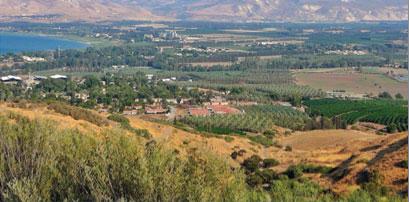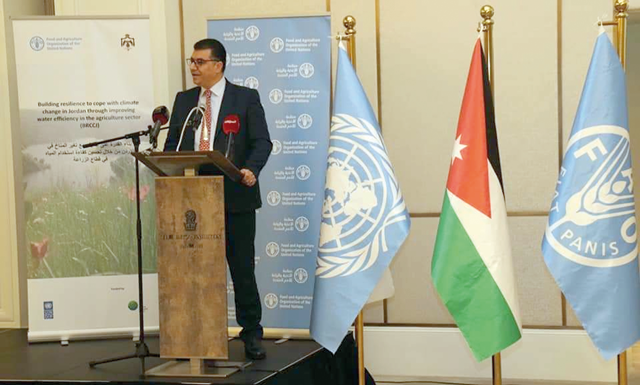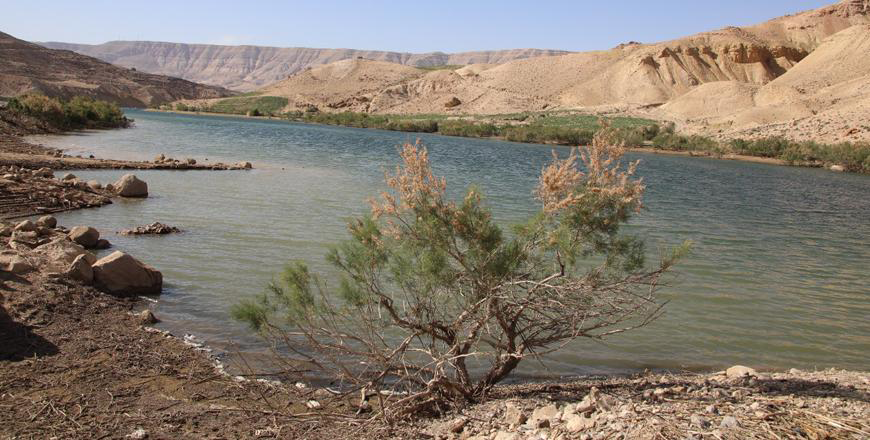You are here
JVA can improve revenue flows — WB
By JT - Jun 16,2016 - Last updated at Jun 16,2016

‘The Cost of Irrigation Water in the Jordan Valley’, a WB recently published report, examines ways to improve water usage in Jordan (Photo courtesy of World Bank)
AMMAN — Jordan has seen a decline of its agricultural sector productivity over the last six years as a result of prolonged cycles of negative growth and a decrease of productivity per worker. Regional conflict has also curtailed Jordan’s export opportunities substantially, according to a World Bank (WB) report.
“The Cost of Irrigation Water in the Jordan Valley” looks at innovative ways to better manage water in agriculture in one of the world’s most water-stressed countries. The study looks at ways to improve irrigation services delivered by the Jordan Valley Authority (JVA), and efficiency of water use across different cropping patterns.
The recent study, funded by the WB’s Water Partnership Programme, also reviews mechanisms to improve financial cost recovery, through reducing costs and increasing revenues, to manage farmers’ demand for water. Findings reveal that significant cost savings can be made through a larger focus on energy efficiency programmes and better asset management.
Towards improving revenues in a resilient way, the report combines tariff scenario analyses with cropping patterns to show how both farmers and the environment could benefit from shifts in the types of crops produced in some areas.
Growing less water-intensive crops would improve farm resilience to water scarcity in the long-run while providing an opportunity for more sustainable service delivery through higher tariffs — which would affect farmers who grow vegetables much less than those who grow the other major crops (citrus and banana).
An analysis of the distributional impacts of irrigation tariffs demonstrate they are relatively modest, while the number of farmers in the Jordan Valley is small, and the number of poor farmers even smaller, making it relatively easy for the government to provide support or subsidies to poor farmers in the Valley if tariffs were to increase.
In its conclusion, the report says it is clear that the JVA can significantly improve its revenue flows. The rapid increase in industrial tariffs shows that the revenue base can be increased. This increase in revenues will also require a change in accountability regarding the revenues, the report says. Currently, all revenues are transferred to the Treasury and do not return to JVA. As such, the incentive for the JVA to bill and collect efficiently and effectively to expand its revenue base is small.
Jordan is one of the most water-stressed countries in the world. Its annual renewable resources of 145 cubic metres per capita are far below the threshold of severe water scarcity of 500 cubic metres.
The competition among water needs for irrigation, industrial and domestic uses, wetland protection, and in-stream habitat needs continues to pose serious challenges in the Kingdom, according to the WB report.
Related Articles
AMMAN — The UN Food and Agriculture Organisation (FAO) on Wednesday launched the “Building resilience to cope with climate change in Jordan
AMMAN — The Jordan Valley Authority (JVA) has signed six agreements to transfer the management of water distribution from the authority to w
AMMAN — The Jordan Valley Authority (JVA) and USAID representatives on Tuesday signed an agreement to implement projects to reduce water los



















